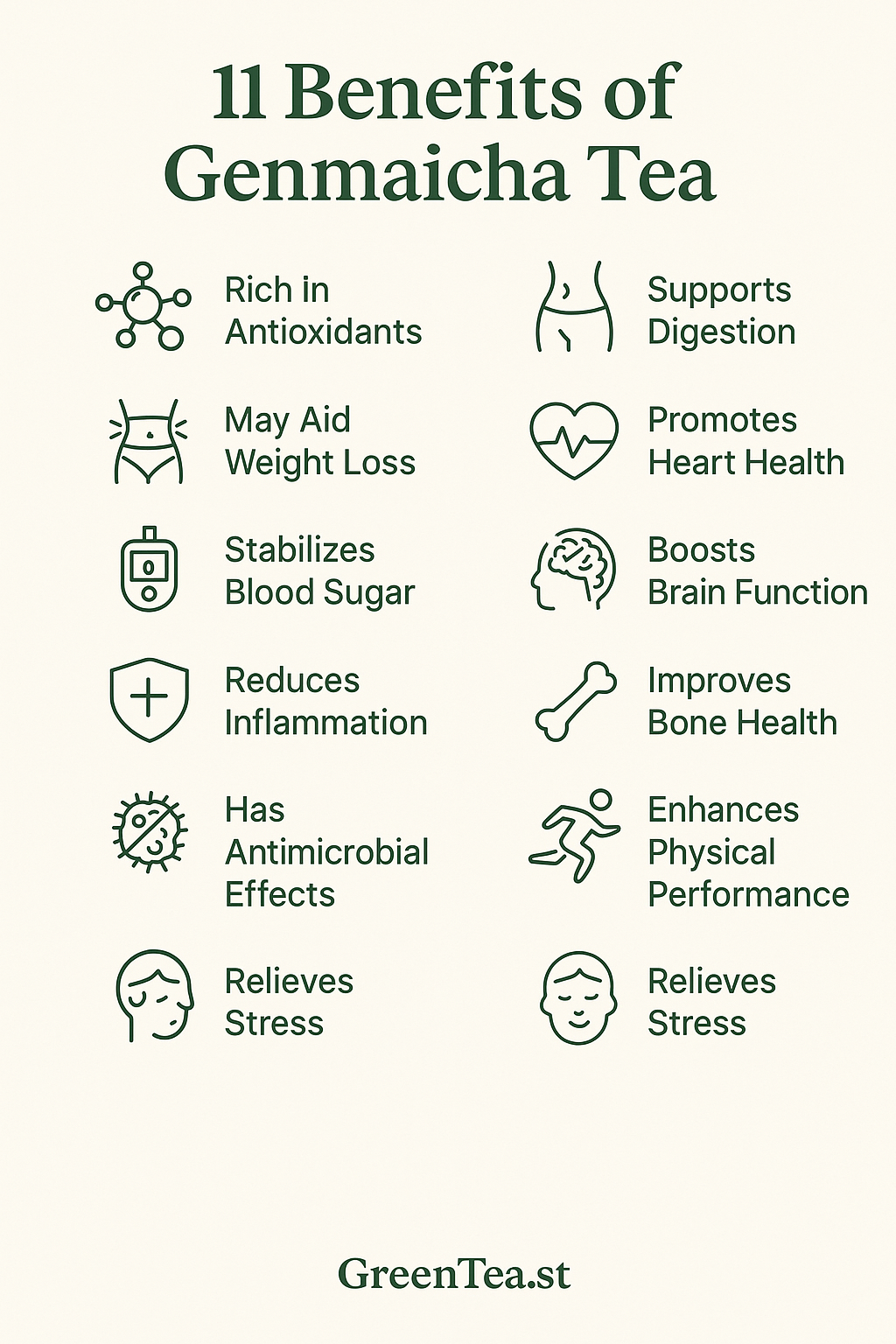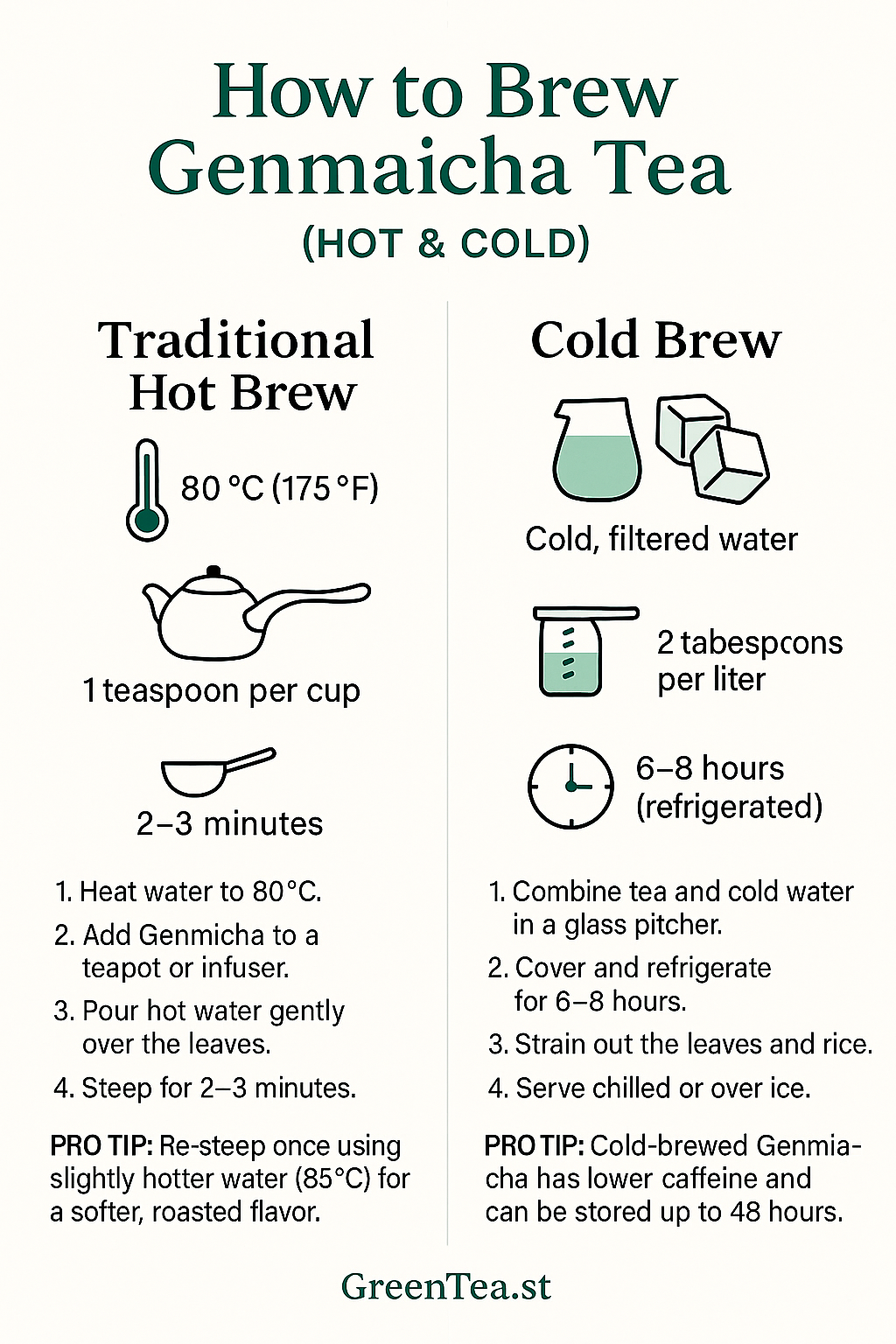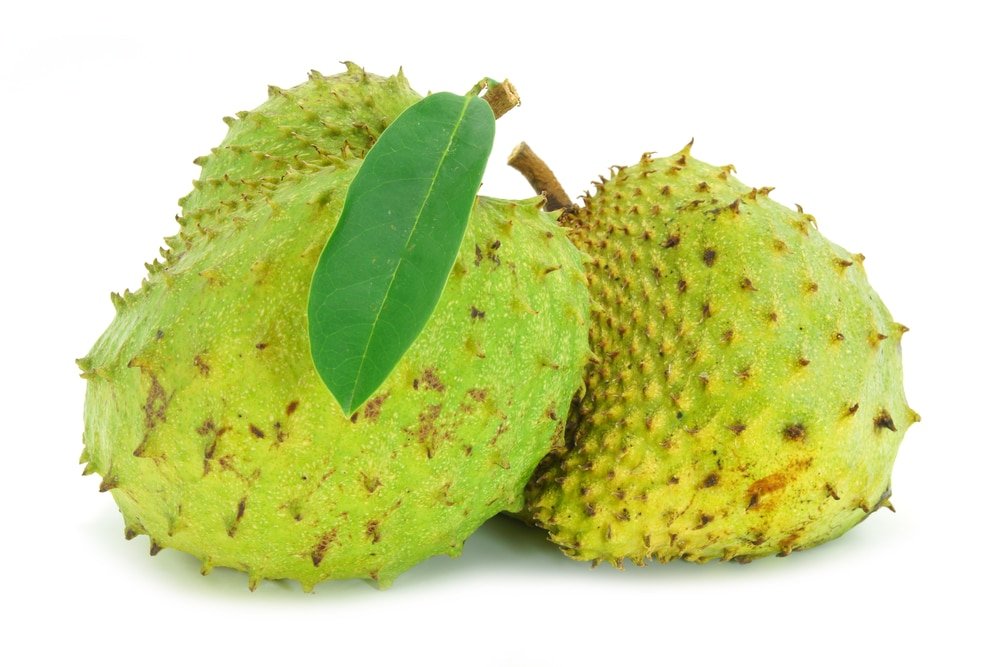Have you ever sipped a cup of green tea and noticed a soft, nutty aroma that feels both comforting and unexpected? That may have been Genmaicha, Japan’s beloved “brown rice tea.” Unlike other teas known for their sharp or grassy notes, Genmaicha offers a warm, toasted flavor that feels grounding after a long day.
This unique blend combines green tea leaves with roasted brown rice, creating a drink that is gentle on the stomach yet rich in antioxidants. Once considered the “people’s tea” in Japan for its affordability, it has now become a favorite among tea enthusiasts worldwide for its flavor balance and calming effects (1).
In this article, we’ll explore what makes Genmaicha special, its nutritional compounds, and 11 science-backed benefits that support digestion, relaxation, heart health, and more.
What is Genmaicha Tea?
Genmaicha, often translated as “brown rice tea,” is a traditional Japanese green tea made by blending Sencha or Bancha leaves with roasted brown rice. Some of the rice grains pop during roasting, giving the tea a popcorn-like aroma that adds to its charm.
Originating centuries ago, Genmaicha was once enjoyed by Japanese commoners who mixed rice with tea leaves to make their tea supply last longer. Over time, its smooth, toasty character and moderate caffeine content gained popularity across all social classes, including Zen monasteries where it was appreciated for its grounding calm.
Today, Genmaicha is still prepared in small batches by gently roasting rice until golden and blending it with steamed green tea leaves. This combination delivers a cup that’s mellow, low in bitterness, and slightly sweet — making it ideal for those sensitive to caffeine or seeking a soothing daily tea (2).
Nutritional and Phytochemical Profile
Genmaicha offers a balanced mix of bioactive compounds that support both body and mind. Because it combines green tea leaves with roasted brown rice, it provides a gentler caffeine experience while still delivering beneficial antioxidants, amino acids, and minerals. Its phytochemical profile reflects a synergy between the earthy rice components and the polyphenol-rich tea leaves (3).
Below is a summary of the key nutrients and compounds found in Genmaicha:



| Compound/Nutrient | Primary Function | Notes |
|---|---|---|
| Catechins (EGCG) | Antioxidant, metabolism support | Helps protect cells from oxidative stress and may enhance fat oxidation. |
| Theanine | Calming amino acid | Promotes relaxation without drowsiness, balances caffeine effects. |
| GABA (Gamma-Aminobutyric Acid) | Neurological relaxant | Naturally reduces stress and may improve focus. |
| Polyphenols | Anti-inflammatory compounds | Support heart and liver health by reducing oxidative damage. |
| Caffeine | Mild stimulant | Offers gentle energy and mental alertness without overstimulation. |
| Vitamin B Complex | Energy metabolism | Supports nervous system function and reduces fatigue. |
| Manganese | Essential mineral | Contributes to bone health and enzyme activation. |
The blend’s lower caffeine content compared to pure green tea makes it ideal for evening consumption. Meanwhile, the roasted rice contributes trace minerals and carbohydrates that soften the overall astringency. This combination makes Genmaicha one of the most balanced teas for daily wellness routines.
11 Health Benefits of Genmaicha Tea

While many teas are praised for their antioxidants or caffeine kick, Genmaicha stands out for its balance. It blends the calm focus of green tea with the earthy comfort of roasted brown rice. Below are the first three science-supported benefits that make Genmaicha a thoughtful choice for daily wellness.
1. Supports Digestion
Genmaicha’s mild flavor and low acidity make it gentle on the stomach, which is why it’s often consumed after meals in Japan. The roasted rice element provides trace fiber and soothing carbohydrates that help ease bloating and discomfort. This combination makes it an excellent post-meal drink for people with sensitive digestion.
The catechins and polyphenols in green tea may help promote healthy gut bacteria and reduce inflammation in the digestive tract. Studies suggest that these compounds can inhibit the growth of harmful microbes and support smoother digestion (4). Drinking a warm cup of Genmaicha after a heavy meal may therefore calm the stomach and encourage natural digestive function.
2. Helps Regulate Blood Sugar Levels
One of Genmaicha’s lesser-known benefits is its potential to support blood sugar regulation. The roasted brown rice contributes compounds that may slow glucose absorption, while the catechins from green tea have been shown to improve insulin sensitivity. Together, they create a synergistic effect that may stabilize blood sugar levels after meals.
In one study, regular consumption of green tea catechins was linked to better glucose control and reduced fasting blood sugar levels in adults with mild insulin resistance (5). Genmaicha’s gentle caffeine content can also help maintain steady energy levels without causing spikes or crashes, making it a smart beverage for those monitoring metabolic health.
3. Promotes Relaxation and Stress Relief
Despite containing caffeine, Genmaicha is known for its calming qualities. This is largely due to L-theanine, an amino acid naturally present in green tea that helps the brain produce alpha waves associated with relaxation. The roasted rice aroma also contributes psychologically to a sense of warmth and comfort.
Research shows that L-theanine promotes relaxation without causing drowsiness and can reduce heart rate responses to stress (6). Many tea drinkers find that Genmaicha provides mental clarity without jitteriness, making it ideal for winding down after work or pairing with mindfulness practices like journaling or meditation.
4. May Aid in Weight Management
Genmaicha can be a supportive addition to a balanced weight management plan. The catechins, particularly epigallocatechin gallate (EGCG), may help increase energy expenditure and promote fat oxidation during moderate activity. Combined with its low calorie content and mild caffeine, Genmaicha offers a natural way to stay hydrated and energized without excess sugar or additives.
A clinical review found that catechin-rich green tea could modestly enhance fat metabolism and aid weight control when combined with a healthy lifestyle (7). Because Genmaicha delivers these catechins in a more digestible, gentle form, it’s a tea you can enjoy daily without overstimulating your system.
5. Supports Cardiovascular Health
Regular consumption of green tea, including Genmaicha, has been linked to improved cardiovascular function. The polyphenols and flavonoids in green tea help protect the lining of blood vessels and may reduce LDL cholesterol oxidation — a factor that contributes to plaque buildup. The result is better circulation and long-term heart health.
One long-term Japanese study found that individuals who drank several cups of green tea per day had a lower risk of heart disease and stroke compared to non-drinkers (8). Genmaicha’s unique combination of tea and rice provides a heart-healthy alternative that delivers antioxidants while remaining lower in caffeine than most traditional teas or coffee.
6. Enhances Mental Alertness
Genmaicha promotes focused alertness rather than overstimulation. Its modest caffeine content, balanced by L-theanine, creates a smoother cognitive boost that enhances concentration and memory without the anxious edge associated with coffee. This makes it especially suitable for work, study sessions, or morning routines.
In controlled studies, the combination of caffeine and L-theanine has been shown to improve cognitive performance and attention while reducing mental fatigue (9). Genmaicha’s earthy flavor and stable energy effect make it a dependable companion for maintaining calm focus throughout the day.
7. May Reduce Inflammation
Chronic inflammation plays a role in many health conditions, from joint pain to cardiovascular disease. The polyphenols in Genmaicha, particularly catechins like EGCG, have been found to inhibit inflammatory pathways and reduce oxidative stress at the cellular level. This makes Genmaicha not only soothing to drink but also potentially protective over time.
Laboratory studies show that green tea catechins can suppress pro-inflammatory cytokines and reduce oxidative markers in the body (10). Drinking Genmaicha regularly may therefore help maintain healthy inflammation levels, especially when combined with a balanced diet rich in whole foods.
8. Supports Liver Function
The liver is central to detoxification and metabolism, and the antioxidants in Genmaicha may help protect it from damage caused by toxins or free radicals. Catechins and polyphenols have been shown to support healthy liver enzyme activity and reduce fat accumulation in the liver tissue.
In one clinical study, green tea extract improved markers of liver health in individuals with non-alcoholic fatty liver disease by reducing oxidative stress and lipid peroxidation (11). Genmaicha offers a milder way to receive these benefits, delivering antioxidant compounds that can gently support long-term liver wellness.
9. Strengthens the Immune System
Genmaicha contains a mix of vitamins, minerals, and antioxidants that contribute to immune defense. The presence of catechins, especially EGCG, may help prevent certain pathogens from binding to cell membranes, reducing the likelihood of infection. Meanwhile, trace minerals from the roasted rice support overall vitality and immune resilience.
A review in Nutrients highlighted that tea polyphenols can modulate immune responses and exhibit antimicrobial effects against viruses and bacteria (12). Incorporating Genmaicha into a daily routine can therefore act as an easy, comforting habit to reinforce natural immunity throughout the year.
10. Promotes Oral Health
Regularly drinking Genmaicha may contribute to better oral hygiene. The catechins in green tea possess natural antibacterial properties that can help reduce the growth of harmful oral bacteria responsible for plaque formation and bad breath. Meanwhile, the polyphenols inhibit acid production, protecting enamel from decay.
A systematic review found that green tea catechins significantly lowered the levels of Streptococcus mutans, one of the primary bacteria linked to tooth decay and gum disease (13). Because Genmaicha is milder and less acidic than many beverages, it provides these oral health benefits without eroding enamel or staining teeth.
11. Provides Antioxidant Protection Against Aging
Among all its benefits, Genmaicha’s antioxidant potential stands out. Catechins, polyphenols, and manganese help neutralize free radicals, slowing down cellular damage that contributes to aging. Over time, this can support skin elasticity, energy balance, and even cognitive longevity.
In research, tea polyphenols have been shown to reduce oxidative damage to DNA and proteins, mechanisms closely linked to aging and chronic disease (14). Enjoying a cup of Genmaicha daily can therefore be a simple, restorative ritual that supports graceful aging from within.
How to Brew Genmaicha Tea

The beauty of Genmaicha lies not only in its flavor but also in the calming ritual of preparing it. Brewing it correctly allows the toasted rice aroma and the mild sweetness of the green tea leaves to blend harmoniously. Whether you prefer it hot or cold, careful attention to water temperature, steeping time, and ratio ensures the perfect cup every time.
Choosing the Right Genmaicha
Before brewing, start with fresh, high-quality Genmaicha. Look for a blend made with Sencha or Bancha leaves and whole roasted brown rice rather than broken fragments or artificial flavorings. The rice should appear evenly roasted with a warm, nutty scent. If the leaves smell stale or grassy, the tea has likely lost its delicate aroma.
Store your Genmaicha in an airtight container, away from sunlight, moisture, and strong odors. Because it contains both tea and rice, it can absorb humidity easily, so keeping it in a cool, dry place is essential for maintaining freshness and flavor.
Hot Brew Method: Traditional Japanese Style
Brewing Genmaicha the traditional way brings out its signature toasty warmth and balanced sweetness. Here’s a step-by-step approach used in Japanese tea culture:
- Measure the Tea
Use 1 teaspoon (2–3 grams) of Genmaicha per cup (about 240 ml). Adjust slightly to taste; more tea will yield a deeper flavor, while less will keep it lighter. - Heat the Water
Genmaicha performs best at 80°C (175°F) — just below boiling. Water that’s too hot can scorch the green tea leaves, resulting in bitterness. If you don’t have a thermometer, simply boil the water and let it sit for about 2 minutes before pouring. - Add and Steep
Place the tea leaves into a pot or infuser. Pour the hot water gently over them and allow it to steep for 2–3 minutes. A transparent or glass teapot can help you watch the infusion and control its intensity. - Strain and Serve
Once the steeping time is up, strain the tea immediately to prevent over-extraction. The liquid should appear light golden or amber, with a soft roasted aroma. Sip slowly and notice how the nutty rice notes round out the green tea’s natural umami.
Brewing Tip:
Genmaicha can often be re-steeped once. For the second infusion, use slightly hotter water (about 85°C) and steep for only one minute. The second brew will be mellower, with more emphasis on the toasted rice flavor.
Cold Brew Method: Refreshing and Smooth
Cold brewing Genmaicha produces a cleaner, sweeter, and almost creamy taste. It’s perfect for summer or for anyone who prefers a gentle, caffeine-light tea experience.
- Prepare the Blend
Add 2 tablespoons of Genmaicha to a liter of cold, filtered water in a glass bottle or pitcher. - Refrigerate and Steep
Cover the container and let it steep in the refrigerator for 6–8 hours (or overnight). The slow infusion draws out the flavor gradually, creating a naturally sweet tea with lower bitterness and acidity. - Strain and Serve
Once ready, strain out the tea leaves and rice. Pour the tea over ice or drink it straight from the fridge. You can garnish it with a lemon slice or a sprig of mint for an extra refreshing twist.
Cold Brew Tip:
Because cold water extracts fewer tannins and caffeine, cold-brewed Genmaicha is ideal for evening consumption or for people who are caffeine-sensitive. It also keeps well in the refrigerator for up to 48 hours without losing flavor.
Perfecting the Experience
- Water Quality: Use soft or filtered water for a cleaner taste. Hard tap water can dull the tea’s flavor and aroma.
- Teaware: A kyusu teapot (a small Japanese side-handle pot) offers the best control, but any ceramic or glass teapot works well.
- Pairings: Genmaicha pairs beautifully with light meals, sushi, rice crackers, or even simple breakfast dishes like oatmeal.
Brewing Genmaicha isn’t just about making tea — it’s about creating a small pause in your day. The scent of roasted rice and the soft steam rising from your cup offer a sensory reminder of balance, patience, and simplicity.
Side Effects and Safety
Genmaicha is generally considered safe for most people and can be enjoyed daily as part of a balanced lifestyle. However, like all teas containing caffeine and plant compounds, it should be consumed in moderation. Here are a few considerations to keep in mind before making it a daily ritual.
- Moderate Caffeine Intake
Although Genmaicha has less caffeine than other green teas, it still contains enough to cause restlessness or sleep disruption in sensitive individuals. Limiting intake to two or three cups a day helps maintain balance, especially in the evening. - Avoid on an Empty Stomach
Drinking green tea before eating can occasionally lead to mild stomach discomfort or nausea. This is due to its tannin content, which may increase acidity when no food is present. Pairing it with a small snack prevents this effect. - Interactions with Iron Absorption
The tannins in green tea can reduce the absorption of non-heme iron from plant-based foods. To avoid this, drink Genmaicha between meals rather than immediately after eating iron-rich dishes (15). - Pregnancy and Breastfeeding Precautions
Pregnant or breastfeeding individuals should be mindful of caffeine consumption. While Genmaicha is lower in caffeine than coffee or matcha, limiting intake to one or two cups daily is advisable unless otherwise recommended by a healthcare provider. - Source Quality Matters
Always choose organic, pesticide-free Genmaicha from reputable brands. Since both tea and rice can absorb agricultural chemicals, organic sourcing ensures purity and prevents potential contamination from residues or additives.
FAQs
Yes, but only mildly. Because it blends green tea with roasted brown rice, Genmaicha contains significantly less caffeine than most pure green teas or coffee — typically around 10–15 mg per cup. It provides gentle alertness without jitteriness.
Absolutely. When consumed in moderation (2–3 cups daily), Genmaicha can be part of a healthy routine. Its low caffeine and high antioxidant content make it suitable for both morning and evening enjoyment.
Yes, it can. The L-theanine in green tea helps calm the nervous system and improve focus. Combined with Genmaicha’s roasted aroma, it offers a naturally soothing experience that supports relaxation.
In small amounts, yes. Genmaicha’s caffeine content is lower than most teas, but pregnant individuals should limit intake to one or two cups a day and consult a healthcare provider if unsure.
Genmaicha has a unique, toasty flavor that’s slightly sweet and nutty, balanced by the fresh, grassy notes of green tea. Many drinkers describe it as comforting and mellow — a perfect blend of warmth and clarity.
Conclusion
Genmaicha is more than just a tea blend — it’s a quiet reminder that balance can be both simple and satisfying. By pairing nutrient-rich green tea with roasted brown rice, this Japanese classic offers a flavor and health profile unlike any other.
From supporting digestion and regulating blood sugar to promoting relaxation, heart health, and immune strength, each cup delivers benefits that nourish both body and mind. Its gentle caffeine level makes it suitable for nearly any time of day, while its antioxidants contribute to long-term wellness and graceful aging.
Modern research continues to confirm what Japanese households have known for centuries: that Genmaicha is both grounding and restorative (16). Whether enjoyed hot after a meal or cold on a warm afternoon, it invites a moment of calm in the middle of life’s pace.
So, as you prepare your next cup, breathe in the toasted aroma, sip slowly, and remember — wellness doesn’t have to be complicated. Sometimes, it’s as simple as rice and tea.



Join the 7‑Day “Better Gut” Plan
Pop in your email and we’ll send Lesson 1 + the printable list.







